Funkadelic
———————————————————————

The Afro-Alien Diaspora
I pledge allegiance to the funk,
the whole funk,
and nothing but the funk,
so help me James, Sly and George,
Amen.
“As it is written henceforth…that on the Eighth Day, the Cosmic Strumpet of MOTHER NATURE was spawned to envelop this Third Planet in FUNKACIDAL VIBRATIONS. And She birthed Apostles Ra, Hendrix, Stone & Clinton to preserve all funkiness of man unto eternity…”
(“Wet Epic Debauchery,” liner notes, Standing On The Verge Of Getting It On, 1974)
“Behold, I am Funkadelic. I am not of your world. But fear me not, I will do you no harm. Loan me your funky mind and I shall play with it. For nothing is good unless you play with it. And all that is good, is nasty!”
(“What Is Soul,” Funkadelic, 1969)
As early as 1969, George Clinton and his “Parliament-Funkadelic Thang” took on the identities of funky aliens from outer space. Like Sun Ra and Lee “Scratch” Perry, Clinton grew up in a community where black people inhabited an otherized zone. These artists simply took a position of marginality and turned it into their own sur-reality, tweaked with their own imaginations. By the mid- seventies, Clinton took the boundary between science fiction and social reality and tie-dyed it. Clinton mostly used Parliament as his vehicle for sci-fi themes, while Funkadelic focused on Clinton’s iconoclastic musical ideas. While I am giving the “Funkalelic” in P-Funk the often-neglected attention it deserves, the story of Parliament is too intertwined with Funkadelic to completely ignore.
Clinton had lost the rights to the names “Parliament” and “Funkadelic” in the early 80s. Subsequently his cyborg funky bunch has sporadically toured under the rubric of the P-Funk All-Stars. It is easy to forget that Parliament and Funkadelic, while sharing basically the same members, once had very different identities — from their sound, to their styles, philosophies and attitudes. When people say they love George Clinton’s music, they generally mean Parliament or the P-Funk All-Stars. Parliament had the hit records, the colorful spaceship stage shows and costumes, and the upbeat funky dance music. Funkadelic, especially in the beginning, was the lesser known, down ‘n’ dirty, lysergic-crazed, evil, inbred rock ‘n’ roll twin.
“I recall, when I left a little town in North Carolina, I tried to escape this music. I said it was for the old country folks. I went to New York, got slick, got my hair made (heh-heh- heh-heh), I was cool. I was cool. But I had no groove, no groove. I had no groove. But now, fly on baby…Dig…Can you feel that baby? It’s called Funkadelic music. It will blow your funky mind.”
(“Mommy, What’s A Funkadelic?,” Funkadelic, 1969)
George Clinton was born in Kannapolis, North Carolina. He moved with his family to Newark, New Jersey in 1956, where Clinton named his teenage doo-wop group after a brand of cigarettes. The Parliaments recorded their first single in 1959. After working as a hair dresser by day and singing at night, Clinton decided to try his luck in Detroit, Michigan, home of the burgeoning Motown label. The Parliaments recorded some material for the label, but failed to get it released. Instead, they released singles on the rival Golden World label, and Revilot, just as it closed down in 1967. Clinton went back to the barbershop in New Jersey, until he learned that “(I Wanna) Testify” was a big hit. He went back to the revived label and recorded a few more songs. The last single, “Good Old Music,” credited the Funkadelics as co-authors. This was their back-up band, with lead guitarist Eddie Hazel, rhythm guitarist Lucius Tawl Ross, bassist Billy Nelson, drummer Ramon “Tiki” Fulwood and organist Mickey Atkins.
In an interview with John Corbett, Clinton recalled, “We just went off into the psychedelic thing to be different. We started treating it like a band, like a rock ‘n’ roll band. At the same time the guy at Revilot had skipped town and we couldn’t use the name Parliaments, so we just recorded the band. They were our backing band, but then we switched it — we became their backup singers.” Thus began what many consider as the classic era of Funkadelic.
“What is soul?
I don’t know! Huh! Uh!
Soul is a hamhock in your cornflakes”
(“What Is Soul”, Funkadelic, 1969)
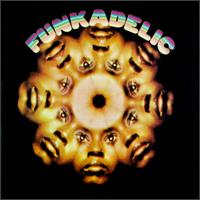 The first Funkadelic album, released on a small indie Detroit label called Westbound, is a supernova, the sound of Clinton’s first explosion of creativity. It is a continuation as much as it is a beginning. The songs are steeped in a down-home southern- fried blues that is as old as turn-of-the-century blues from the Mississippi Delta, or even African music from centuries ago. Who’s to say it doesn’t go further back to some cosmic brothers from another world and time. Despite the often playful lyrics, the slow, deep funk groove exposes a much darker mood. Underneath the jokes was an underlying menace, a subliminal anger that is understandable coming from Detroit in 1969, a year after it burned in angry race riots, and Martin Luther King and Malcolm X were murdered, and the Black Panthers were a force to be reckoned with. While their songs occasionally offered positive social messages like “I Got A Thing, You Got A Thing, Everybody’s Got A Thing” (“Let’s get together and support one another”), there was a dark side to Funkadelic that may not have been entirely tongue-in-cheek. The liner notes to Maggot Brain and America Eats Its Young quote the Process Church of the Final Judgement — an apocalyptic cult religion that, according to Clarence Eugene “Fuzzy” Haskins, flirted with Satanism. It was enough to put the fear of God into Fuzzy, one of the original lead singers. Fuzzy gave up music and became a born-again Christian and a minister.
The first Funkadelic album, released on a small indie Detroit label called Westbound, is a supernova, the sound of Clinton’s first explosion of creativity. It is a continuation as much as it is a beginning. The songs are steeped in a down-home southern- fried blues that is as old as turn-of-the-century blues from the Mississippi Delta, or even African music from centuries ago. Who’s to say it doesn’t go further back to some cosmic brothers from another world and time. Despite the often playful lyrics, the slow, deep funk groove exposes a much darker mood. Underneath the jokes was an underlying menace, a subliminal anger that is understandable coming from Detroit in 1969, a year after it burned in angry race riots, and Martin Luther King and Malcolm X were murdered, and the Black Panthers were a force to be reckoned with. While their songs occasionally offered positive social messages like “I Got A Thing, You Got A Thing, Everybody’s Got A Thing” (“Let’s get together and support one another”), there was a dark side to Funkadelic that may not have been entirely tongue-in-cheek. The liner notes to Maggot Brain and America Eats Its Young quote the Process Church of the Final Judgement — an apocalyptic cult religion that, according to Clarence Eugene “Fuzzy” Haskins, flirted with Satanism. It was enough to put the fear of God into Fuzzy, one of the original lead singers. Fuzzy gave up music and became a born-again Christian and a minister.
“What is soul?
I don’t know! Huh! Uh!
Soul is the ring around your bathtub.”
It seems unlikely that George Clinton took the Process Church seriously for long. Everything he did showed that his songs were meant to benefit everyone in a positive way. But there’s no mistake that the early music was hard. In stark contrast to their later cartoonish space-freak image, the band looked and sounded as earthy as the dirt on the cover art for Maggot Brain. Funkadelic were bad motherfuckers. They shared management and stages with the other “bad boys of Detroit” — Ted Nugent & the Amboy Dukes, MC5, and The Stooges. Their management even cooked up a marriage between George and Iggy Pop as a publicity stunt. Iggy was probably relieved that it was never followed through. “He could have been my wife,” tittered Clinton. Clinton would certainly have incorporated Iggy into his entourage like a cyber-funkified bodysnatcher.
Funkadelic’s unique relationship with white rock ‘n’ roll started when they had borrowed amps from Vanilla Fudge. They were so pleased with the high volume that they immediately got their own. Like Jimi Hendrix and Sly and the Family Stone, they reclaimed rock music as their own. Their crossover appeal to white audiences, while on a much smaller scale than Hendrix and Sly, was demonstrated when they graced the cover of the second issue of Creem. While they could not compete with the other two giants at their best, Funkadelic synthesized their own fusion of styles that would eventually be just as influential. Their grim inner-city blues were just as soulful as Marvin Gaye’s and Stevie Wonder’s concurrent explorations in social consciousness.
“What is soul?
I don’t know! Huh! Uh!
Soul is a joint rolled in toilet paper.”
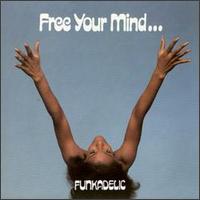 By 1970’s Free Your Mind And Your Ass Will Follow, Funkadelic sounded as if they had absorbed some of MC5’s aggression and The Stooges’ decadent nihilism. They continued their critiques of capitalism and booty-liberation theology, but instead of the blues, Free Your Mind’s title track showcased lysergic- drenched noise, with Bernie Worrell’s slavering, distorted three- note organ riff similar to Velvet Underground’s “Sister Ray.” Funkadelic were decidedly into drugs, and the unhinged, sprawling length of “Free Your Mind” was a dead giveaway. Clinton was bemused that “They think that’s the best…I’m so embarrassed. We did that entire record in one day, mixed it and walked outta here.” Despite, or maybe because of that, it worked. Their drug abuse reached critical mass in 1971, and the band was on the verge of falling apart. Nevertheless, Clinton was able to take a potentially disastrous recording session and squeezed out yet another Funkadelic classic, with the sorrowful guitar solo on “Maggot Brain” as the centerpiece. Eddie Hazel was proving himself to be a funk-rock guitarist second only to the recently deceased Hendrix. “I had four baby junkies; they settled to go to sleep right there on the session.
By 1970’s Free Your Mind And Your Ass Will Follow, Funkadelic sounded as if they had absorbed some of MC5’s aggression and The Stooges’ decadent nihilism. They continued their critiques of capitalism and booty-liberation theology, but instead of the blues, Free Your Mind’s title track showcased lysergic- drenched noise, with Bernie Worrell’s slavering, distorted three- note organ riff similar to Velvet Underground’s “Sister Ray.” Funkadelic were decidedly into drugs, and the unhinged, sprawling length of “Free Your Mind” was a dead giveaway. Clinton was bemused that “They think that’s the best…I’m so embarrassed. We did that entire record in one day, mixed it and walked outta here.” Despite, or maybe because of that, it worked. Their drug abuse reached critical mass in 1971, and the band was on the verge of falling apart. Nevertheless, Clinton was able to take a potentially disastrous recording session and squeezed out yet another Funkadelic classic, with the sorrowful guitar solo on “Maggot Brain” as the centerpiece. Eddie Hazel was proving himself to be a funk-rock guitarist second only to the recently deceased Hendrix. “I had four baby junkies; they settled to go to sleep right there on the session. 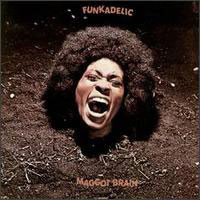 So I had to make a record out of whatever I got…” Clinton instructed Hazel to play as if his mother had just died. And play he did. “Maggot Brain” was an excruciating, beautiful piece of guitar work. “But the rest of the band sounded like shit! So I faded they ass right the fuck out and just let [Eddie Hazel] play by hisself the whole fuckin’ track.” Aside from The Meters, their instrumental contemporaries located in Memphis, their rhythmic superioriity was undisputible in syncopated masterpieces like “Hit It And Quit It.” 1971’s Maggot Brain was the third and last album of the original Funkadelic lineup and sound.
So I had to make a record out of whatever I got…” Clinton instructed Hazel to play as if his mother had just died. And play he did. “Maggot Brain” was an excruciating, beautiful piece of guitar work. “But the rest of the band sounded like shit! So I faded they ass right the fuck out and just let [Eddie Hazel] play by hisself the whole fuckin’ track.” Aside from The Meters, their instrumental contemporaries located in Memphis, their rhythmic superioriity was undisputible in syncopated masterpieces like “Hit It And Quit It.” 1971’s Maggot Brain was the third and last album of the original Funkadelic lineup and sound.
“I have tasted the maggots in the mind of the universe.
I was not offended.
For I knew I had to rise above it all,
or drown in my own shit.”
(Maggot Brain, 1971)
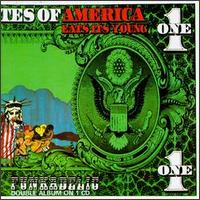 America Eats Its Young was a transitional album in many ways, with Clinton attempting a concept album in the tradition of Sgt. Pepper and Tommy. Leaving behind the grim and gritty groove of the original band, Clinton replaced everyone but Eddie Hazel and Tiki Fulwood, and added string arrangements. The album included most of the core members who would guarantee Funkadelic’s continued greatness for the years to come — keyboardist Bernie Worrell, guitarist Phelps Collins and his little brother, William “Bootsy” Collins on bass. America Eats… was a problematic album with a few failed experiments. But on the whole it’s nearly as enjoyable as any Funkadelic, with the slow, sexy groove of “Pussy” and the struttin’ “Loose Booty” as standouts.
America Eats Its Young was a transitional album in many ways, with Clinton attempting a concept album in the tradition of Sgt. Pepper and Tommy. Leaving behind the grim and gritty groove of the original band, Clinton replaced everyone but Eddie Hazel and Tiki Fulwood, and added string arrangements. The album included most of the core members who would guarantee Funkadelic’s continued greatness for the years to come — keyboardist Bernie Worrell, guitarist Phelps Collins and his little brother, William “Bootsy” Collins on bass. America Eats… was a problematic album with a few failed experiments. But on the whole it’s nearly as enjoyable as any Funkadelic, with the slow, sexy groove of “Pussy” and the struttin’ “Loose Booty” as standouts.
Bootsy Collins in many ways became the “soul” of later Funkadelic, the band’s rhythmic and charismatic anchor. A native of Cincinnati, Ohio, a teenaged Bootsy formed the Pacemakers with his brother Phelps “Catfish” Collins in 1969. In a stroke of luck, James Brown hired the Pacemakers to replace his mutinied band. They toured the United States, Europe and Africa, and recorded the classics “Sex Machine,” “Super Bad,” “Talkin’ Loud & Sayin’ Nothing” and “Soul Power.” Bootsy soon felt too restricted by Brown’s disciplined regimen, and left in 1971 to form The House Guests, who boldly advertised themselves as James Brown’s band. “Pretty soon we started hearing about Funkadelic — this other group people said was wild and crazy just like us. So I started spreading the word that we’d like to crush them on stage. It got where we heard about them so much we were actually trying to track them down just to prove who was the best band.” Instead of playing with 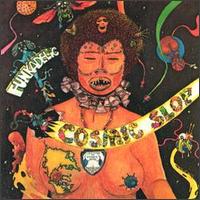 Funkadelic, however, The House Guests became Funkadelic. Amidst drug problems and professional jealousies, the original band had collapsed, and once again Bootsy found himself in someone else’s band. They contributed to America Eats Its Young, but Bootsy was determined to have his own band, and moved the band back to Cincinnati as the Complete Strangers. Aside from cutting a single, nothing happened for over a year. He moved back to Detroit in 1973 and did session work with a variety of people, including work for Motown. Gradually, Bootsy gave in to the wiles of Dr. Funkenstein, first with an uncredited bass line on “Cosmic Slop,” then co-writing Parliament’s “Up For the Down Stroke”, half of Chocolate City and three songs from Funkadelic’s Let’s Take It To The Stage.
Funkadelic, however, The House Guests became Funkadelic. Amidst drug problems and professional jealousies, the original band had collapsed, and once again Bootsy found himself in someone else’s band. They contributed to America Eats Its Young, but Bootsy was determined to have his own band, and moved the band back to Cincinnati as the Complete Strangers. Aside from cutting a single, nothing happened for over a year. He moved back to Detroit in 1973 and did session work with a variety of people, including work for Motown. Gradually, Bootsy gave in to the wiles of Dr. Funkenstein, first with an uncredited bass line on “Cosmic Slop,” then co-writing Parliament’s “Up For the Down Stroke”, half of Chocolate City and three songs from Funkadelic’s Let’s Take It To The Stage.
“Should there be some who would choose to ignore this maladroided message of doom, I further proclaim it to be the right of the noble followers of FUNKADELIA to counteract the inane, infantile antics of those pimpatory, sapless stooges and exploitive ecdysiasts of evil. FUNKADELIA IS UPON THEE!”
(Liner notes, Cosmic Slop, 1973)
Cosmic Slop marked the beginning of the second peak of Funkadelic, featuring a lighter, more danceable and versatile 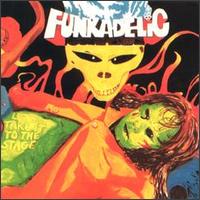 sound. Despite the venemous liner notes protesting the “pimpafication” of nature, politics, capitalism and love to the point of “cosmicide,” the musical mood is more buoyant. Like Pedro Bell’s album covers, they take James Brown’s groin-level sexuality and make it more cartoonish. Cosmic Slop (1973), Standing On The Verge Of Getting It On (1974) and Let’s Take It To The Stage (1975) was a trilogy perfectly balanced between kick-out-the-jams rockers like “Red Hot Momma,” sexy love grinds like “I’ll Stay,” and the nitrous-oxide humor of “No Compute (Spit Don’t Make No Babies).”
sound. Despite the venemous liner notes protesting the “pimpafication” of nature, politics, capitalism and love to the point of “cosmicide,” the musical mood is more buoyant. Like Pedro Bell’s album covers, they take James Brown’s groin-level sexuality and make it more cartoonish. Cosmic Slop (1973), Standing On The Verge Of Getting It On (1974) and Let’s Take It To The Stage (1975) was a trilogy perfectly balanced between kick-out-the-jams rockers like “Red Hot Momma,” sexy love grinds like “I’ll Stay,” and the nitrous-oxide humor of “No Compute (Spit Don’t Make No Babies).”
“Funk upon a time, in the days of the Funkapuss, the concept of specially designed Afro-nauts capable of funkatizing galaxies, was first laid on Man Child, but was later repossessed and placed among the secrets of the pyramids, until a more positive attitude towards this most sacred phenomenon, Clone Funk, could be acquired. There in these terrestrial projects it would wait along with its co-inhabitants, the Kings and Pharaohs, like sleeping beauties, for the kiss that would release them to multiply in the image of the Chosen One, Dr. Funkenstein. And funk is its own reward. May I frighten you?”
(“Prelude,” The Clones of Dr. Funkenstein (1976)
Meanwhile, Parliament was exhumed. Osmium, recorded in 1970, was released on the Invictus label, only to be completely ignored. Fortunately, it was eventually reissued with early singles and unreleased tracks recorded between 1970 and 1972 as First Thangs in 1992. It contains some of the heaviest funk meltdowns ever recorded by the any band, including “Red Hot Mama,” “Breakdown,” “I Call My Baby Pussycat,” “There Is Nothing Before Me But Thang” and “Funky Woman.” It also features some of the most bizarre experiments that were almost never heard, including flirtations with country, doo-wop, chamber music, gospel and (no, I’m not kidding) bagpipes. Up For The Down Stroke (1974) was their second stab at a debut on their new label, Casablanca. It featured unique vocal harmonies and looser arrangements with horns rather than guitars (courtesy of the Horny Horns — Macao Parker and Fred Wesley). “The Goose” is a nine plus minute groove with a seductive, incessantly throbbing beat that won’t let up. I’ve known many a love child claiming to be whelped to the sexy whispers of Isaac Hayes’ “By The Time I Get To Phoenix” or Marvin Gaye’s “Let’s Get It On.” “The Goose” probably has them both beat by conceiving triplets for every single illegitimate rugrat conceived to non-P-Funksters.
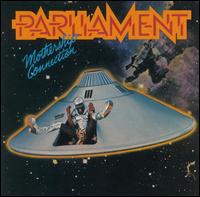 In Parliament, the core group of singers, George Clinton, Calvin Simon, Fuzzy Haskins, Grady Thomas, Raymond Davis, Gary Shider, Glen Goins and Bootsy Collins, once again found themselves on the front stage with Funkadelic as the backup band. Always comfortable in the spotlight, Clinton assumed multiple pseudonyms, including Dr. Funkenstein, Mr. Wiggles, The Undisco Kid, Starchild, Sir Nose D’ Voidofsense, Lollipop man and Bumpnoxious Rumpofsteelskin. His mission was to clone enough cyber-funk afro-nauts, a.k.a. the children of production, a.k.a. P-Funk, to battle the placebo syndrome that plagued most of the seventies. The placebo syndrome was, of course, the decidedly un-funky treatment of Black music by disco. Parliament reached their peak early on with Mothership Connection (1975). It is their signature album, perfecting the polished, expansive dance grooves that serve as a flexible background for George Clinton’s pun-filled theme of expatriate Afro-Aliens broadcasting their interstellar uncut funk to the Earth’s decidedly un-funky radio stations.
In Parliament, the core group of singers, George Clinton, Calvin Simon, Fuzzy Haskins, Grady Thomas, Raymond Davis, Gary Shider, Glen Goins and Bootsy Collins, once again found themselves on the front stage with Funkadelic as the backup band. Always comfortable in the spotlight, Clinton assumed multiple pseudonyms, including Dr. Funkenstein, Mr. Wiggles, The Undisco Kid, Starchild, Sir Nose D’ Voidofsense, Lollipop man and Bumpnoxious Rumpofsteelskin. His mission was to clone enough cyber-funk afro-nauts, a.k.a. the children of production, a.k.a. P-Funk, to battle the placebo syndrome that plagued most of the seventies. The placebo syndrome was, of course, the decidedly un-funky treatment of Black music by disco. Parliament reached their peak early on with Mothership Connection (1975). It is their signature album, perfecting the polished, expansive dance grooves that serve as a flexible background for George Clinton’s pun-filled theme of expatriate Afro-Aliens broadcasting their interstellar uncut funk to the Earth’s decidedly un-funky radio stations.
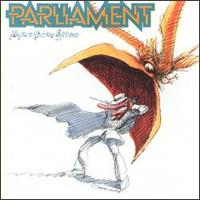 While the following albums, The Clones of Dr. Funkenstein (1976), Funkentelechy vs. the Placebo Syndrome (1977) and Motor Booty Affair (1978) are top-notch party music, they are largely variations of the same theme, with the occasional dance floor hits. Parliament really made its mark with its audacious tours that combined the stage shows of Kiss with the Electric Light Orchestra into orgiastic celebrations of excess, flying their extra-terrestrial freak flags in pimp costumes and motorized spaceships. “Put niggers in places that you don’t usually see ’em. And NOBODY had seen ’em on no spaceships! Once you seen ’em sittin’ on spaceship like it was a Cadillac, then it was funny, cool” recalled Clinton. Their largest tour of the seventies, The P-Funk Earth Tour is documented on a double live album in 1977. It only shows that you had to be there to fully appreciate the experience of hearing “Give Up The Funk (Tear The Roof Off The Sucker)” while the band literally hovered higher and higher in their flying saucer, threatening to do just that.
While the following albums, The Clones of Dr. Funkenstein (1976), Funkentelechy vs. the Placebo Syndrome (1977) and Motor Booty Affair (1978) are top-notch party music, they are largely variations of the same theme, with the occasional dance floor hits. Parliament really made its mark with its audacious tours that combined the stage shows of Kiss with the Electric Light Orchestra into orgiastic celebrations of excess, flying their extra-terrestrial freak flags in pimp costumes and motorized spaceships. “Put niggers in places that you don’t usually see ’em. And NOBODY had seen ’em on no spaceships! Once you seen ’em sittin’ on spaceship like it was a Cadillac, then it was funny, cool” recalled Clinton. Their largest tour of the seventies, The P-Funk Earth Tour is documented on a double live album in 1977. It only shows that you had to be there to fully appreciate the experience of hearing “Give Up The Funk (Tear The Roof Off The Sucker)” while the band literally hovered higher and higher in their flying saucer, threatening to do just that.
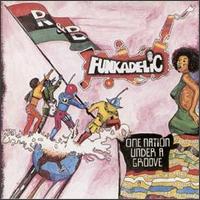 Bootsy’s nights were truly full during these tours, often opening the shows with his own Bootsy’s Rubber Band, and then getting onstage with P-Funk. After Bootsy became involved in co- writing songs, Clinton recognized Bootsy’s need to express himself as an autonomous artist. By getting Bootsy’s Rubber Band signed to WB, he was able to keep Bootsy as an overtime P-Funk member. A creative Bootsy was a happy Bootsy, and his contributions made Funkadelic downright slap-happy. After a closet-cleaning Tales Of Kidd Funkadelic, Clinton left the indie Westbound label for WB. From then on, it became increasingly difficult for the uninitiated to distinguish Funkadelic from Parliament. Hardcore Jollies (1976), One Nation Under A Groove (1978), Uncle Jam Wants You (1979) and The Electric Spanking of War Babies (1981) all had at least one transcendent moment of potty-mouth liberation. While One Nation is by far the best, it is also overrated by many, claiming it to be their best album. Its bubbly electro-funk is very much keyboardist Bernie Worrell’s album, and it deserves props for influencing countless numbers of successors. But to ears weaned on the first seven Westbound classics, One Nation just doesn’t compare.
Bootsy’s nights were truly full during these tours, often opening the shows with his own Bootsy’s Rubber Band, and then getting onstage with P-Funk. After Bootsy became involved in co- writing songs, Clinton recognized Bootsy’s need to express himself as an autonomous artist. By getting Bootsy’s Rubber Band signed to WB, he was able to keep Bootsy as an overtime P-Funk member. A creative Bootsy was a happy Bootsy, and his contributions made Funkadelic downright slap-happy. After a closet-cleaning Tales Of Kidd Funkadelic, Clinton left the indie Westbound label for WB. From then on, it became increasingly difficult for the uninitiated to distinguish Funkadelic from Parliament. Hardcore Jollies (1976), One Nation Under A Groove (1978), Uncle Jam Wants You (1979) and The Electric Spanking of War Babies (1981) all had at least one transcendent moment of potty-mouth liberation. While One Nation is by far the best, it is also overrated by many, claiming it to be their best album. Its bubbly electro-funk is very much keyboardist Bernie Worrell’s album, and it deserves props for influencing countless numbers of successors. But to ears weaned on the first seven Westbound classics, One Nation just doesn’t compare.
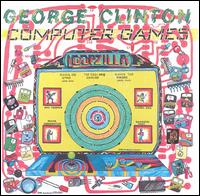 Perhaps the Placebo Syndrome affected even the Godfather of Funk himself. By 1978 Clinton was stretching his creative and financial resources too thin by supporting the mammoth tours with his own money, along with the side projects of Bootsy’s Rubber Band, Parlet and Brides of Funkenstein. The last few Parliament albums and lackluster solo albums almost got to the point of sucking. But Clinton is a hearty motherfunker, the doggest of them all. He survived with his style intact, continuing to bring P-Funk’s live magic as we speak. I highly recommend attending a P-Funk show thenext chance you get. While it appears I’ve set out to prove the superiority of classic Funkadelic over Parliament and late P-Funk, it is obviously a distinction between apples and oranges. It’s simply a good thing for P-Funk fans to be able to make a distinction between early Funkadelic and later Parliament- Funkadelic. I don’t even listen to Funkadelic very often. I don’t have the energy, because when I do, I listen to it all, obsessively. I can’t help but shake my booty into exhaustion until I collapse to my knees and bow to the heaviness and deepness that is the Funkadelic…and then do it again.
Perhaps the Placebo Syndrome affected even the Godfather of Funk himself. By 1978 Clinton was stretching his creative and financial resources too thin by supporting the mammoth tours with his own money, along with the side projects of Bootsy’s Rubber Band, Parlet and Brides of Funkenstein. The last few Parliament albums and lackluster solo albums almost got to the point of sucking. But Clinton is a hearty motherfunker, the doggest of them all. He survived with his style intact, continuing to bring P-Funk’s live magic as we speak. I highly recommend attending a P-Funk show thenext chance you get. While it appears I’ve set out to prove the superiority of classic Funkadelic over Parliament and late P-Funk, it is obviously a distinction between apples and oranges. It’s simply a good thing for P-Funk fans to be able to make a distinction between early Funkadelic and later Parliament- Funkadelic. I don’t even listen to Funkadelic very often. I don’t have the energy, because when I do, I listen to it all, obsessively. I can’t help but shake my booty into exhaustion until I collapse to my knees and bow to the heaviness and deepness that is the Funkadelic…and then do it again.
A.S. Van Dorston (October 1995)
Most of the quotes from George Clinton were taken from interviews by John Corbett in his book, Extended Play: Sounding Off From John Cage To Dr. Funkenstein (1994). For everything you’d ever need to know about P-Funk, see The Motherpage and back issue number Four of Motorbooty (Motorbooty World-Wide Communications, P.O. Box 7944, Ann Arbor, MI 48107).
Discography
1970 Funkadelic
1970 Free Your Mind…And Your Ass Will Follow
1971 Maggot Brain
1972 America Eats Its Young
1973 Cosmic Slop
1974 Standing on the Verge of Getting It On
1975 Let’s Take It to the Stage
1976 Hardcore Jollies
1976 Tales of Kidd Funkadelic
1978 One Nation Under a Groove
1979 Uncle Jam Wants You
1980 Connections & Disconnections
1981 The Electric Spanking of War Babies
2007 By Way Of The Drum
2008 Toys
Live albums
1996 Live: Meadowbrook, Rochester, Michigan – 12th
Compilation albums
1975 Funkadelic’s Greatest Hits
1977 The Best of the Early Years Volume One
1993 Music For Your Mother: Funkadelic 45s
1994 Hardcore Funk Jam
1994 The Best of Funkadelic: 1976-1981
1997 Finest
1997 Ultimate Funkadelic
1998 The Very Best of Funkadelic 1976-1981
1999 The Best
2000 Funk Gets Stronger
2000 The Complete Recordings 1976-81
2000 Cosmic Slop
2000 Suitably Funky
2000 The Original Cosmic Funk Crew
2003 Motor City Madness: The Ultimate Funkadelic Westbound Compilation
2005 The Whole Funk & Nothing But The Funk : Definitive Funkadelic 1976 – 1981
2007 Funkadelic
Singles
1972 “A Joyful Process”
1975 “Get Off Your Ass and Jam”
1978 “One Nation Under A Groove”
1979 “(Not Just) Knee Deep”

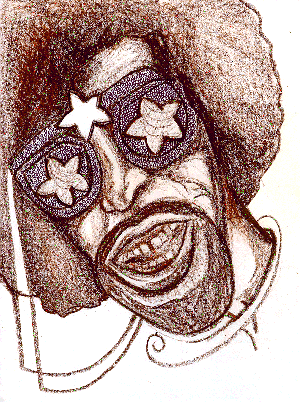
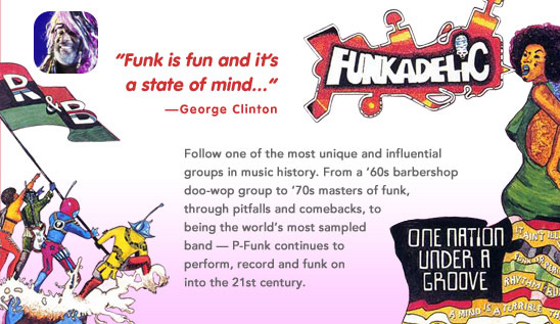
































































































And thank you for the feedback guys..much appreciated..keep diggin’.. 🙂